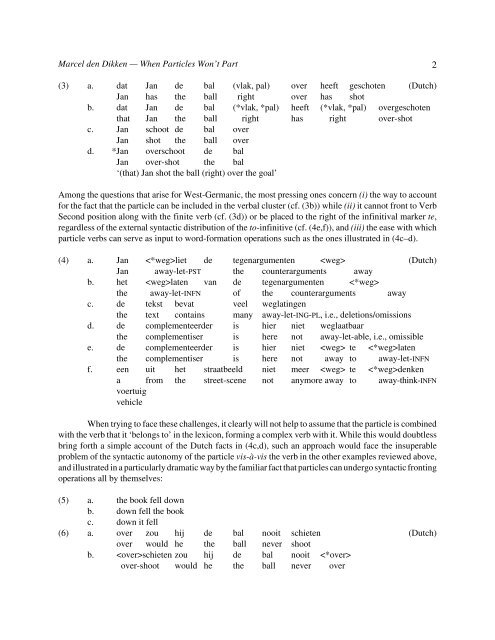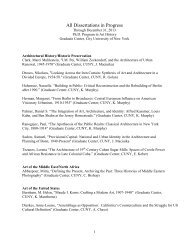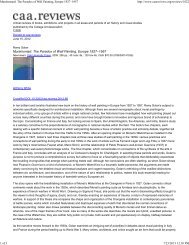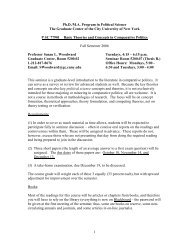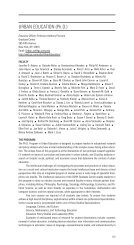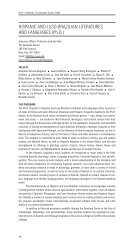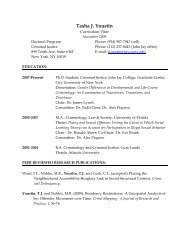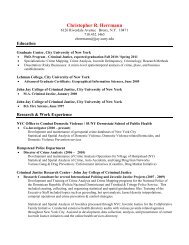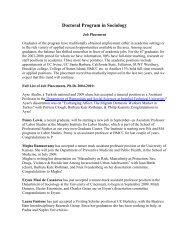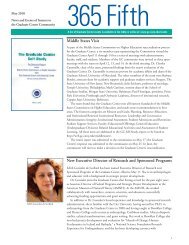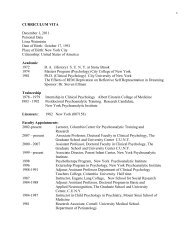When Particles Won't Part - CUNY Graduate Center
When Particles Won't Part - CUNY Graduate Center
When Particles Won't Part - CUNY Graduate Center
You also want an ePaper? Increase the reach of your titles
YUMPU automatically turns print PDFs into web optimized ePapers that Google loves.
Marcel den Dikken — <strong>When</strong> <strong><strong>Part</strong>icles</strong> Won’t <strong>Part</strong><br />
(3) a. dat Jan de bal (vlak, pal) over heeft geschoten (Dutch)<br />
Jan has the ball right over has shot<br />
b. dat Jan de bal (*vlak, *pal) heeft (*vlak, *pal) overgeschoten<br />
that Jan the ball right has right over-shot<br />
c. Jan schoot de bal over<br />
Jan shot the ball over<br />
d. *Jan overschoot de bal<br />
Jan over-shot the bal<br />
‘(that) Jan shot the ball (right) over the goal’<br />
Among the questions that arise for West-Germanic, the most pressing ones concern (i) the way to account<br />
for the fact that the particle can be included in the verbal cluster (cf. (3b)) while (ii) it cannot front to Verb<br />
Second position along with the finite verb (cf. (3d)) or be placed to the right of the infinitival marker te,<br />
regardless of the external syntactic distribution of the to-infinitive (cf. (4e,f)), and (iii) the ease with which<br />
particle verbs can serve as input to word-formation operations such as the ones illustrated in (4c–d).<br />
(4) a. Jan liet de tegenargumenten (Dutch)<br />
Jan away-let-PST the counterarguments away<br />
b. het laten van de tegenargumenten <br />
the away-let-INFN of the counterarguments away<br />
c. de tekst bevat veel weglatingen<br />
the text contains many away-let-ING-PL, i.e., deletions/omissions<br />
d. de complementeerder is hier niet weglaatbaar<br />
the complementiser is here not away-let-able, i.e., omissible<br />
e. de complementeerder is hier niet te laten<br />
the complementiser is here not away to away-let-INFN<br />
f. een uit het straatbeeld niet meer te denken<br />
a from the street-scene not anymore away to away-think-INFN<br />
voertuig<br />
vehicle<br />
<strong>When</strong> trying to face these challenges, it clearly will not help to assume that the particle is combined<br />
with the verb that it ‘belongs to’ in the lexicon, forming a complex verb with it. While this would doubtless<br />
bring forth a simple account of the Dutch facts in (4c,d), such an approach would face the insuperable<br />
problem of the syntactic autonomy of the particle vis-à-vis the verb in the other examples reviewed above,<br />
and illustrated in a particularly dramatic way by the familiar fact that particles can undergo syntactic fronting<br />
operations all by themselves:<br />
(5) a. the book fell down<br />
b. down fell the book<br />
c. down it fell<br />
(6) a. over zou hij de bal nooit schieten (Dutch)<br />
over would he the ball never shoot<br />
b. schieten zou hij de bal nooit <br />
over-shoot would he the ball never over<br />
2


